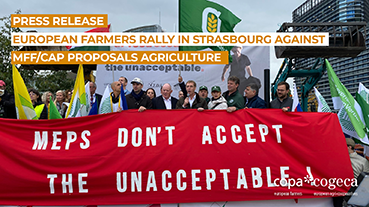The European organisation representing farmers and agricultural cooperatives, Copa-Cogeca, has stated that the proposals presented by the European Commission for the next Multiannual Financial Framework (2028–2034) and the reform of the Common Agricultural Policy (CAP) contain at least ten conditions they deem unacceptable. The organisation warns that, unless the text is substantially revised, it will work to prevent its adoption.
Above all, and together with other actors in the agri-food chain, Copa-Cogeca has called for recognition that without a common and secure approach to agriculture, there can be no lasting stability — not for farmers, not for the whole chain, and not for Europe.
For Europe’s agri-food cooperatives, food security must remain a top political priority in these uncertain times, where security as a whole is a key concern for the European Union. “Agriculture cannot be sidelined in the Commission’s priorities or treated as an adjustment variable. For this reason, we consider the Commission’s approach to be a strategic and historic misstep,” they stated.
For the first time in more than 60 years of engagement in agricultural policy, European farming organisations find these proposals unacceptable and cannot endorse them. According to Copa-Cogeca, the ten red lines being crossed are as follows:
A proposed MFF structure that contradicts the provisions of the Treaty. By integrating the CAP into a single fund, the Commission undermines EU Treaty provisions and the very framework that safeguards Europe’s food security.
A 20% cut to the CAP budget that fails to meet needs or ambitions. Agriculture stands at the forefront of major transitions amid growing uncertainty, yet these cuts reduce agricultural support to less than 15% of total EU spending — completely disconnected from today’s economic, social, geopolitical, and climate realities.
A major step backward in EU history: the erosion of the CAP’s common nature. Copa-Cogeca fears that the proposal would transfer too much power to Member States, fracturing the “C” in CAP, weakening the internal market, and creating inequality between countries.
The end of the two-pillar structure eliminates complementarity and predictability. Merging the EAGF and EAFRD into a single fund sacrifices rural development, investment, competitiveness, sustainability, and territorial cohesion.
Implementation will bring more complexity, administrative burden, and costs. Instead of simplifying, the “single national plan” approach will trigger a massive and costly administrative reorganisation, adding confusion and uncertainty for farmers and cooperatives.
An unrealistic income framework that jeopardises a common EU approach. Differentiated co-financing levels and greater reliance on national contributions risk undermining farmers’ incomes, distorting competition, and eroding the policy’s common character.
Rigid tools that fail to respect the diversity of European agriculture. An incoherent approach to area-based income support — through degressivity and payment capping — ignores the need to support all genuine contributors to food security.
The strengthening of farmers’ position in the food chain is undermined. More sectors will have to compete for fewer resources in operational programmes, while flexible national contributions could create disparities between farmers, cooperatives, and producer organisations.
A regression in the EU consultation process. Copa-Cogeca considers the Commission’s approach entirely inadequate — lacking proper consultation, policy options, and impact assessment.
Erosion of the EU’s strategic autonomy and growing external dependence. By failing to secure agriculture as a cornerstone of European security through a strong, common, and well-funded policy, the EU puts its strategic autonomy at risk.
“On 16 July, the Commission crossed too many of these red lines, posing an existential threat to our sectors, to the integrity of the Single Market, and to the food security of 450 million Europeans,” Copa-Cogeca warned, adding: “Instead of concrete proposals with a clear vision and direction, we were given grand speeches and political action pointing the other way.”
This sectoral alarm comes amid high volatility in agricultural markets, geopolitical tensions, rising production costs, and a “mountain of challenges” in sustainability.
In the coming months, the Commission is expected to present the final texts of the investment programmes under the new financial framework. Pressure from Copa-Cogeca and other European farming organisations will be intense. The sector insists that what is at stake is not only the competitiveness of their farms, but also Europe’s food sovereignty and the stability of its rural areas.







